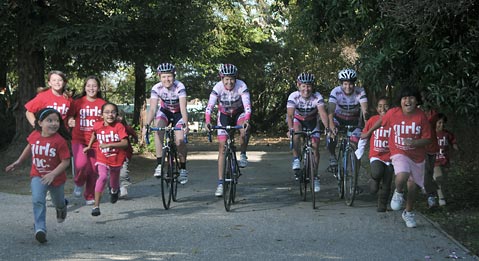2010 Race Across America
S.B.’s Kalyra Women’s Cycling Team Pedals Coast-to-Coast

Out of the West they will come, lit up by the rising sun, rolling out of the mountains, across the plains, through sleepy towns, around bustling cities, then streaking away from the sunset and leaving a rosy speck on the horizon at the end of the day.
“It’s a bird, it’s a plane … it’s the Pink Hurricane!” Santa Barbara’s Kalyra Women’s Cycling Team went coast-to-coast in 2007, and, gluttons for punishment, they are doing it again.
The quartet of Jill Gass, Lisa Tonello, Sonia Ross, and Avalon Jenkins-Balker is the only women’s team entered in the 2010 Race Across America (RAAM), but the legacy left by four Florida riders in 1996 will be pushing them through all 3,000 miles and up 110,000 feet of hill-climbing. Their objective is to break the women’s record of six days, 12 hours, and 28 minutes.
They are not underestimating the difficulty of the task. After they leave the starting line at Oceanside, California, on Saturday, June 12, they will have to average better than 18 miles per hour as they pedal without stopping, in relay fashion, all the way to Annapolis, Maryland.
“We’re looking to go one mile an hour faster than we did the last time,” Gass said. “It sounds easy, but it’s still going to be a challenge”—especially considering that when they finished in 2007 after seven days, 6½ hours, they were utterly exhausted from physical and psychological strain. So why do it again?
“It’s like childbirth,” said Tonello. “You forget all the bad stuff.” Tonello is the mother of three, as is Jenkins-Balker. With an average age of 50, the Kalyra riders have endured many trying experiences in their lives. Gass, Tonello, and Ross did the 2007 RAAM along with Denise Clark—who is on the team’s support crew this year—and they have figured out ways to make it go more smoothly.
Gass, a critical-care nurse and one of the nation’s top female Masters cyclists, cited a list of improvements: better awareness of nutritional and liquid requirements (“We underestimated just how much it would take to get through the desert”); a crew of 16 that has both experience (“Half of them are back from ’07”) and better compatibility (“Significant others are out; they are kind of a distraction; they don’t want to see you suffer, and you don’t want to be worrying about them”); improved technique (“Our transitions [the exchange of riders every 15 minutes] will be faster and cleaner”) and technology (GPS and iPhones); and better planning for the finishing stretch, when everybody is at near-meltdown stage (“We’re sending a crew to the end a day ahead of time so they can sleep and be rested and ready for us”).
Then there is the new rider. “Avalon is a very determined woman,” Tonello said. Jenkins-Balker is taking her second fling at high-energy cycling, after being an alternate on the Olympic track sprinting team in 1988. In the years after that, her weight ballooned to 370 pounds.
“Take somebody who has obsessive-compulsive tendencies, take away bike racing, and guess what happens,” Jenkins-Balker said. “Kaboom. I became a walking waterbed.” Gastric bypass surgery arrested the weight gain, and the inspiration of her youngest daughter, national time trial champion Somersby Jenkins, got her shedding pounds on the bike again.
“My daughter inspired me to be strong, smart, and bold,” Jenkins-Balker said. “Now I can give back and inspire a future generation.” Sponsored by the Kalyra Winery and other community businesses, the cycling team is raising money for Girls Incorporated of Greater Santa Barbara (motto: “Strong, Smart, and Bold”).
“It’s not really for the glory of the record,” Jenkins-Balker said of her motivation. “It’s trying to be far-reaching. It’s natural for women to want to do something for other people.”
The team encountered generosity throughout the ride in 2007. “People would give us money, ice, buy us Popsicles and sodas,” Gass said.
There were profound and pleasant scenes in the panorama of America. “We went through Greensburg, Kansas, two weeks after a tornado virtually wiped it off the earth,” Gass said. “The whole town was twisted. We went through at night. Everybody was real quiet.”
Somewhere in Missouri, signs advertised a cavern where marriages are performed. “A woman told me, ‘You can come back here and get married in the stalactites,’” Tonello said. “In Pennsylvania, I was riding alongside Amish in their buggies. How crazy is that?”
It’s just the sort of good stuff that they will remember after it’s all over.
Information about the team and its progress in the RAAM can be found at TeamKalyra.com.



